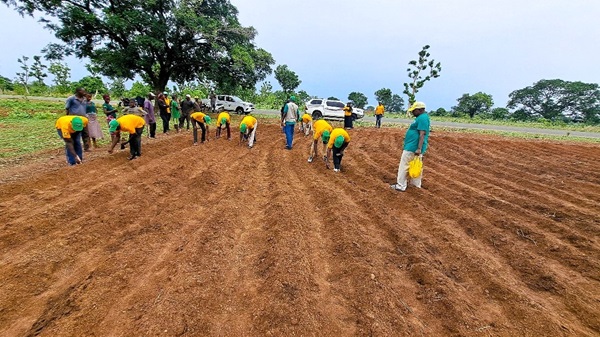
The Sasakawa Africa Association Nigeria (SAA Nigeria), with funding from The Nippon Foundation (TNF), has launched its 2025 Wet Season Farming intervention, targeting 9,000 smallholder farmers across six states – Kano, Jigawa, Gombe, Nasarawa, Benue and Kwara. The initiative aims to bolster food security, raise household incomes and promote climate-smart agricultural practices.
An estimated 45,000 additional farmers are expected to benefit indirectly.
As part of the intervention, SAA Nigeria began distributing certified seeds, fertilisers and agrochemicals to selected beneficiaries. The input distribution is designed to support farmers at the start of the wet season and lay the foundation for increased productivity.
Ahead of the distribution, SAA conducted a preseason training-of-trainers (ToT) workshop for 116 frontline extension agents across the intervention states. The training equipped participants with technical skills in regenerative agriculture and good agronomic practices (GAPs) to support farmer outreach and knowledge transfer at the community level.
Complementing the distribution, SAA has also established 360 community demonstration plots across 90 rural communities. These Farmer Learning Platforms (FLPs) serve as “living classrooms” to showcase a wide range of regenerative practices, such as intercropping, relay cropping, mulching, Urea Deep Placement (UDP) and integrated pest and weed management. These demonstration plots are adapted to local agroecological contexts and designed to boost knowledge exchange and peer learning among farmers.
Reflecting on the impact of SAA’s work, country director of SAA Nigeria, Dr. Godwin Atser said: “For more than 30 years, we have worked side by side with Nigeria’s smallholder farmers, delivering practical, field-tested innovations. Our interventions have consistently improved yields – from 1.9 MT/ha to 5.5 MT/ha in maize and from 1.8 MT/ha to 6 MT/ha in rice. In soybean and cowpea, yields have improved from 0.6 MT/ha to 2.5 MT/ha. This is a result of blending improved inputs with hands-on extension and community-based learning.”
In Gombe State, the Commissioner for Agriculture, Animal Husbandry and Cooperatives, Dr. Barnabas Malle commended SAA’s role in rural development. “SAA has consistently demonstrated a high level of commitment to improving farmers’ livelihoods in our state. Their interventions, especially in training, extension support and timely input delivery, have contributed meaningfully to nutrition, food security and economic development in our rural communities,” he said.
During the official flag-off in Kano, managing director of the Kano State Agricultural and Rural Development Authority (KNARDA), Dr. Farouk Kurawa was represented by the SAA Kano State coordinator, Kassim Safiyyanu. He described SAA as a dependable and visionary development partner. “Sasakawa’s approach is timely, practical and results-driven. Early input distribution sets the tone for a productive season and motivates our farmers to adopt early planting, which is critical for optimal yields,” he said.
Technical coordinator for regenerative agriculture at SAA Nigeria, Dr. Bello Shehu urged field teams to adhere to SAA’s protocols for demonstration plot establishment. He encouraged farmers to engage with SAA’s extension network to deepen their understanding of regenerative agriculture and build resilience to climate shocks.
“This input distribution is not just about seeds and fertilisers; it is a clear affirmation of SAA’s leadership in the sector,” said SAA’s Nasarawa state coordinator, Salome Sabo. “The early support enables our farmers to plan better and embrace innovations that significantly improve productivity and livelihoods,” she added.
A statement by the association’s communication officer, Moses Nongoatse noted that as the wet season progresses, SAA is scaling up implementation by deepening its community presence, reinforcing partnerships with government institutions, development actors and local farming groups.
These efforts are part of a broader strategy to promote regenerative agriculture and build climate resilience at the grassroots level. Through science-based, inclusive programming – anchored in hands-on demonstrations, capacity building, and technology transfer – SAA is driving real transformation in Nigeria’s food systems.
The 2025 Wet Season programme is more than a seasonal intervention; it is a catalyst for transforming smallholder agriculture into a resilient, sustainable engine of national food security and rural prosperity.


